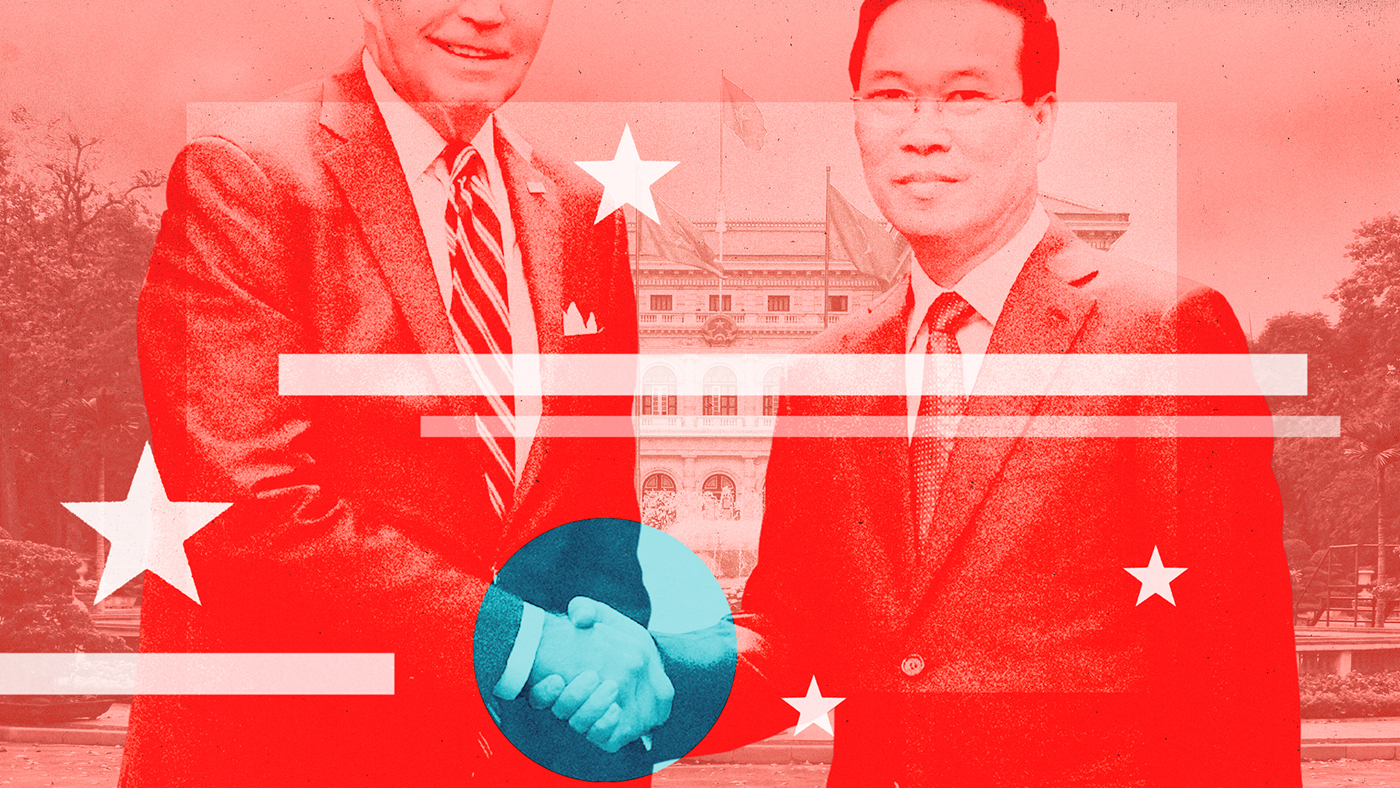Is Biden's whirlwind Vietnam trip a warning to China?
Emphasizing 'growth and stability,' the president keeps an eye on Hanoi's neighbor to the north


A free daily email with the biggest news stories of the day – and the best features from TheWeek.com
You are now subscribed
Your newsletter sign-up was successful
Standing in the shadow of China's spiraling economy, President Biden had a clear and concise message for anyone wondering whether his frenetic trip through Southeast Asia this weekend was aimed at sending a message to Beijing: "I don't want to contain China," Biden told reporters in Vietnam, as he celebrated the recent upgrade in official relations between that country and the United States.
"I think we think too much in terms of Cold War terms," Biden stressed," adding that while he hoped for China's continued economic success, "I want to see them succeed by the rules."
Measured words of encouragement notwithstanding, Biden's time in Vietnam — and his preceding few days at a G-20 conference in Delhi, India — was a "hedge against China" according to Reuters, and a "signal" for Beijing, per The Economist, coming amidst a broader American debate over how best to respond to China's increasing willingness to flex its geopolitical clout.
The Week
Escape your echo chamber. Get the facts behind the news, plus analysis from multiple perspectives.

Sign up for The Week's Free Newsletters
From our morning news briefing to a weekly Good News Newsletter, get the best of The Week delivered directly to your inbox.
From our morning news briefing to a weekly Good News Newsletter, get the best of The Week delivered directly to your inbox.
What the commentators said
America's newly strengthened relationship with Vietnam allows both countries to put the formerly bellicose "ghosts of the past behind them," allowing them to focus on a "shared worry over China's mounting ambitions in the region," The New York Times reported. While neither Biden nor Vietnamese Communist Party General Secretary Nguyen Phu Trong directly invoked China in their official public remarks, it was "an important subtext for the move as Mr. Biden works to establish a network of partnerships in the region to counter aggressive action by Beijing."
The upgraded relationship between the United States and Vietnam, officially a "Comprehensive Strategic Partnership," suggests Hanoi "fears Beijing's aggression in the South China Sea" according to Politico, which also described Vietnam as "grateful for its economic windfall" from the ongoing trade jockeying between the U.S. and China. Hanoi is "navigating frosty relations" between the two superpowers while working to become a "low-cost manufacturing hub," agreed Reuters, noting that "top Chinese officials, possibly including President Xi Jinping," are scheduled to visit Vietnam in the coming weeks.
While China may loom large in Biden's mind during his trip to Hanoi, "the U.S. and its allies are trying to appeal to the global south to build a worldwide consensus against Russia" the Financial Times reported. Russia is currently "in talks for a new $8 billion credit facility to buy heavy weaponry" from its communist ally, according to Reuters. Still, assigning the United States its top-level diplomatic status is an "unusual and significant step for Vietnam and it is a sign of how strong Hanoi's desire is to counterbalance ties with China," Eurasia Group analyst Peter Mumford told FT.
The "greatest win" for the Biden administration, meanwhile, is that this new status "puts it more firmly in Beijing's backyard," the BBC reported, quoting National Security Advisor Jake Sullivan's assertion that Vietnam will play "a leading role [...] in our growing network of partnerships in the Indo-Pacific." That network includes new military bases in the Philippines, and Washington having "remarkably, [...] managed to broker a trilateral agreement with rival East Asian allies, Japan and South Korea." The achievements have "taken the Chinese by surprise," Pacific Forum senior director Dr John Hemmings told the BBC.
A free daily email with the biggest news stories of the day – and the best features from TheWeek.com
What next?
Even before Biden stepped foot in Hanoi, China had criticized his trip, with a government spokesperson urging the U.S. to "abandon the Cold War mentality and zero-sum game mindset." Vietnamese officials, however, have "gauged that China will do little more than harrumph" The Economist reported, noting "how valuable Vietnam is to China" as a major export market. Meanwhile, the upgraded relationship with Vietnam is poised to energize the semiconductor industry and supply chain, which has "emerged as a key source of tension in U.S.-China relations" according to CNN. And while "the rest of Asia underwhelms, Vietnam will still be one of the fastest growing economies"
Still, Americans hoping that Vietnam can be wholly "reeled into its camp" are engaged in "wishful thinking" according to The Economist. Vietnam was never fully up for grabs as an ally. Rather, it likely plans to "balance adroitly between" the U.S. and China, as the two superpowers continue to circle one another for global influence.
Rafi Schwartz has worked as a politics writer at The Week since 2022, where he covers elections, Congress and the White House. He was previously a contributing writer with Mic focusing largely on politics, a senior writer with Splinter News, a staff writer for Fusion's news lab, and the managing editor of Heeb Magazine, a Jewish life and culture publication. Rafi's work has appeared in Rolling Stone, GOOD and The Forward, among others.
-
 Why is the Trump administration talking about ‘Western civilization’?
Why is the Trump administration talking about ‘Western civilization’?Talking Points Rubio says Europe, US bonded by religion and ancestry
-
 Quentin Deranque: a student’s death energizes the French far right
Quentin Deranque: a student’s death energizes the French far rightIN THE SPOTLIGHT Reactions to the violent killing of an ultraconservative activist offer a glimpse at the culture wars roiling France ahead of next year’s elections
-
 Secured vs. unsecured loans: how do they differ and which is better?
Secured vs. unsecured loans: how do they differ and which is better?the explainer They are distinguished by the level of risk and the inclusion of collateral
-
 The fall of the generals: China’s military purge
The fall of the generals: China’s military purgeIn the Spotlight Xi Jinping’s extraordinary removal of senior general proves that no-one is safe from anti-corruption drive that has investigated millions
-
 Epstein files topple law CEO, roil UK government
Epstein files topple law CEO, roil UK governmentSpeed Read Peter Mandelson, Britain’s former ambassador to the US, is caught up in the scandal
-
 Iran and US prepare to meet after skirmishes
Iran and US prepare to meet after skirmishesSpeed Read The incident comes amid heightened tensions in the Middle East
-
 EU and India clinch trade pact amid US tariff war
EU and India clinch trade pact amid US tariff warSpeed Read The agreement will slash tariffs on most goods over the next decade
-
 Israel retrieves final hostage’s body from Gaza
Israel retrieves final hostage’s body from GazaSpeed Read The 24-year-old police officer was killed during the initial Hamas attack
-
 China’s Xi targets top general in growing purge
China’s Xi targets top general in growing purgeSpeed Read Zhang Youxia is being investigated over ‘grave violations’ of the law
-
 Panama and Canada are negotiating over a crucial copper mine
Panama and Canada are negotiating over a crucial copper mineIn the Spotlight Panama is set to make a final decision on the mine this summer
-
 The app that checks if you are dead
The app that checks if you are deadIn The Spotlight Viral app cashing in on number of people living alone in China
